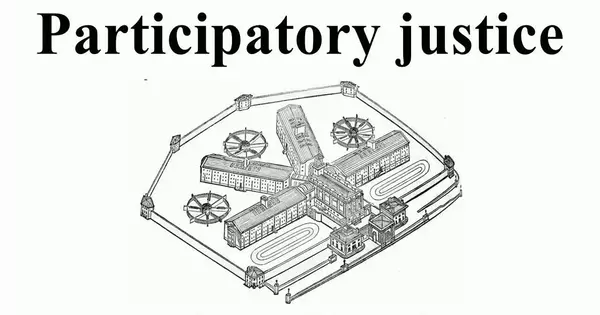In general, participatory justice refers to the direct engagement of people most affected by a particular judgment in the decision-making process itself: this could refer to decisions made in a court of law or by policymakers. It is a concept and approach to justice and governance that emphasizes the active participation of citizens and communities in decision-making processes that influence their lives. It is also known as a participative or inclusive democracy. It is based on the premise that individuals and communities should be able to influence the laws, policies, and institutions that govern them, as well as the resolution of disputes and conflicts.
Popular participation has been described as “the ethical seal of a democratic society” by Friedhelm Hengsbach, a professor of Christian Social Science and Economic and Social Ethics at Frankfurt’s Philosophical-Theological College Sankt Georgen, and “the politics of the future” by Gene Stephens, a criminology professor at the University of South Carolina. It is all about people and their interactions.
Key features of participatory justice include:
- Citizen Engagement: It encourages citizens to participate actively in legal and decision-making processes. Public consultations, community meetings, citizen juries, and other procedures for involving the public in the formulation of laws and policies are examples of such processes.
- Accessibility and Inclusivity: Efforts are made to guarantee that all members of society, especially marginalized and disadvantaged groups, can participate. This can include providing information in many languages, accommodating people with disabilities, and resolving participation hurdles.
- Transparency: The public is given easy access to information on the justice system, laws, and policies, allowing citizens to understand and participate in the legal framework.
- Empowerment: It seeks to empower individuals and communities to take an active role in shaping their own destinies. This can help build a sense of ownership and responsibility for the outcomes of the justice system.
- Conflict Resolution: In addition to legislative and policy-making processes, participatory justice can extend to dispute resolution mechanisms, such as restorative justice practices, where affected parties have a voice in the resolution of conflicts.
- Local Decision-Making: There is an emphasis on local decision-making and community-based justice approaches. This can involve devolving decision-making authority to local levels of government and allowing communities to address their unique needs.
- Civic Education: It cannot function effectively without an informed and engaged populace. Civic education programs can assist people learn their rights and obligations, as well as how to engage in the legal system.
Participatory justice is frequently viewed as a means of addressing concerns of legitimacy and trust in the government and justice system. It can assist in ensuring that laws and policies are more responsive to the interests and values of the community by incorporating residents in decision-making processes. It does, however, provide obstacles, such as ensuring that the process stays inclusive and that choices are made equitably and in accordance with the rule of law.
















